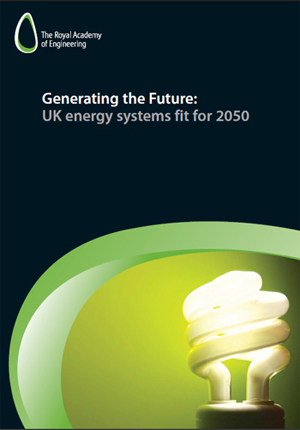Engineers launch CO2 report

A report which argues there is little hope of meeting CO2 reduction targets without the biggest peacetime programme of change ever seen in the UK , was launched in London in March.
Lancaster University EngineeringProfessor Roger Kemp was one of the authors of the report by the working group from the Royal Academy of Engineering which set out to investigate how the UK could achieve its target of cutting CO2 emissions of 80 per cent by 2050.
The report ‘Generating the Future: UK energy systems fit for 2050’ launched at the Science Media Centre , found:
- There is no single ‘silver bullet’ that will achieve the required 80% cuts in greenhouse gas emissions. Fundamental restructuring of the whole of the UK’s energy system will be unavoidable.
- Demand reductions across all sectors of the economy will be essential through a combination of increased efficiencies and behavioural change.
- The full suite of low-carbon energy supply technologies already available (or identified as credible) will be needed, including nuclear, renewables and carbon capture and storage brought together in a balanced way.
- The scale of the engineering challenge is massive.
The report concludes that: “The experience of engineers shows that implementing fundamental changes to a system as large and complex as the UK’s energy system to meet the 2050 greenhouse gas emissions targets will bring with it many challenges for government, business and industry, engineering and the public alike. Turning the theoretical emissions reduction targets into reality will require more than political will: it will require nothing short of the biggest peacetime programme of change ever seen in the UK.
“Despite positive steps, such as the creation of the Department of Energy and Climate Change, current government structures, including market regulation, are, as yet, simply not adequate for the task. This issue must also be addressed as a priority by means of a reorganisation of government departments to coordinate and drive action as well as to provide the clear and stable long-term framework for business and the public that is not currently in evidence. It also needs to be recognised that the significant changes required to the UK energy system to meet the emissions reduction targets will inevitably, involve significant rises in energy costs to end users.”
Professor Kemp said: “In summary, we argue that there is little hope of meeting the target without CO2 reduction having comparable priority to the War on Terror in the weeks following 9-11 and for this commitment to be sustained for decades.”
The report was presented by three of its authors: Dame Sue Ion, Chair of the Royal Academy of Engineering's Energy Scenarios working group; Professor Roger Kemp, Engineering Department, University of Lancaster; Professor Roland Clift, Centre for Environmental Strategy, University of Surrey.